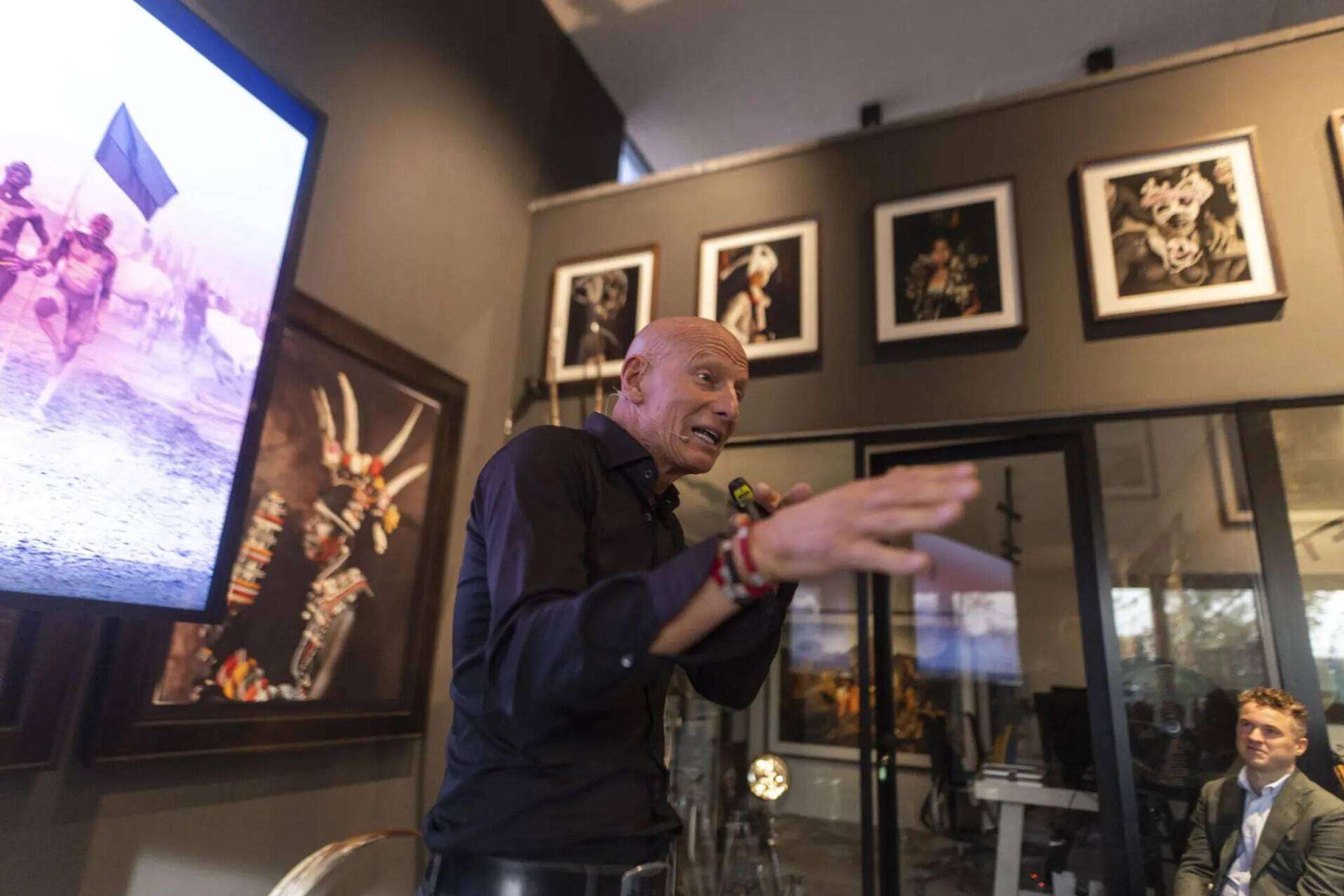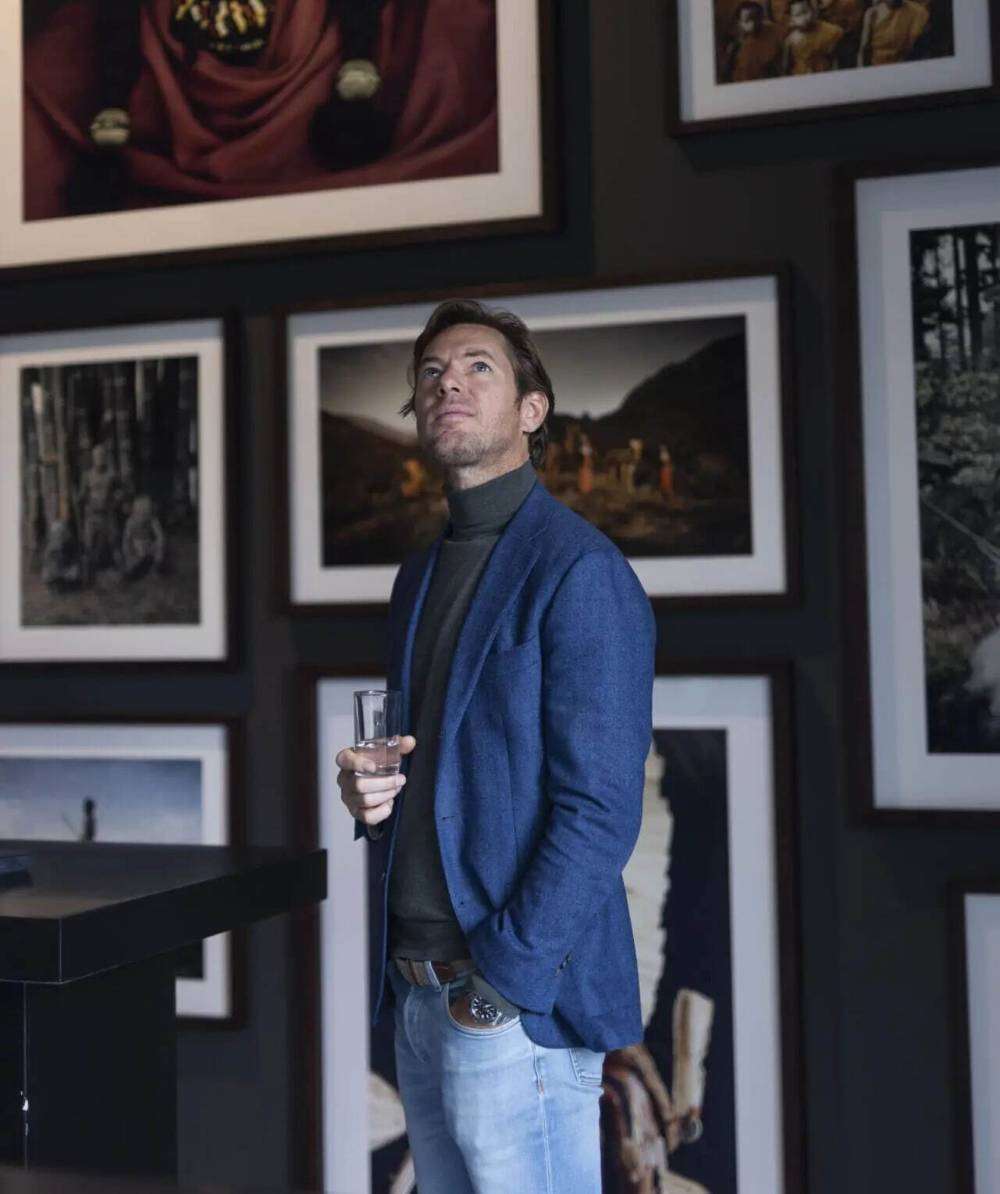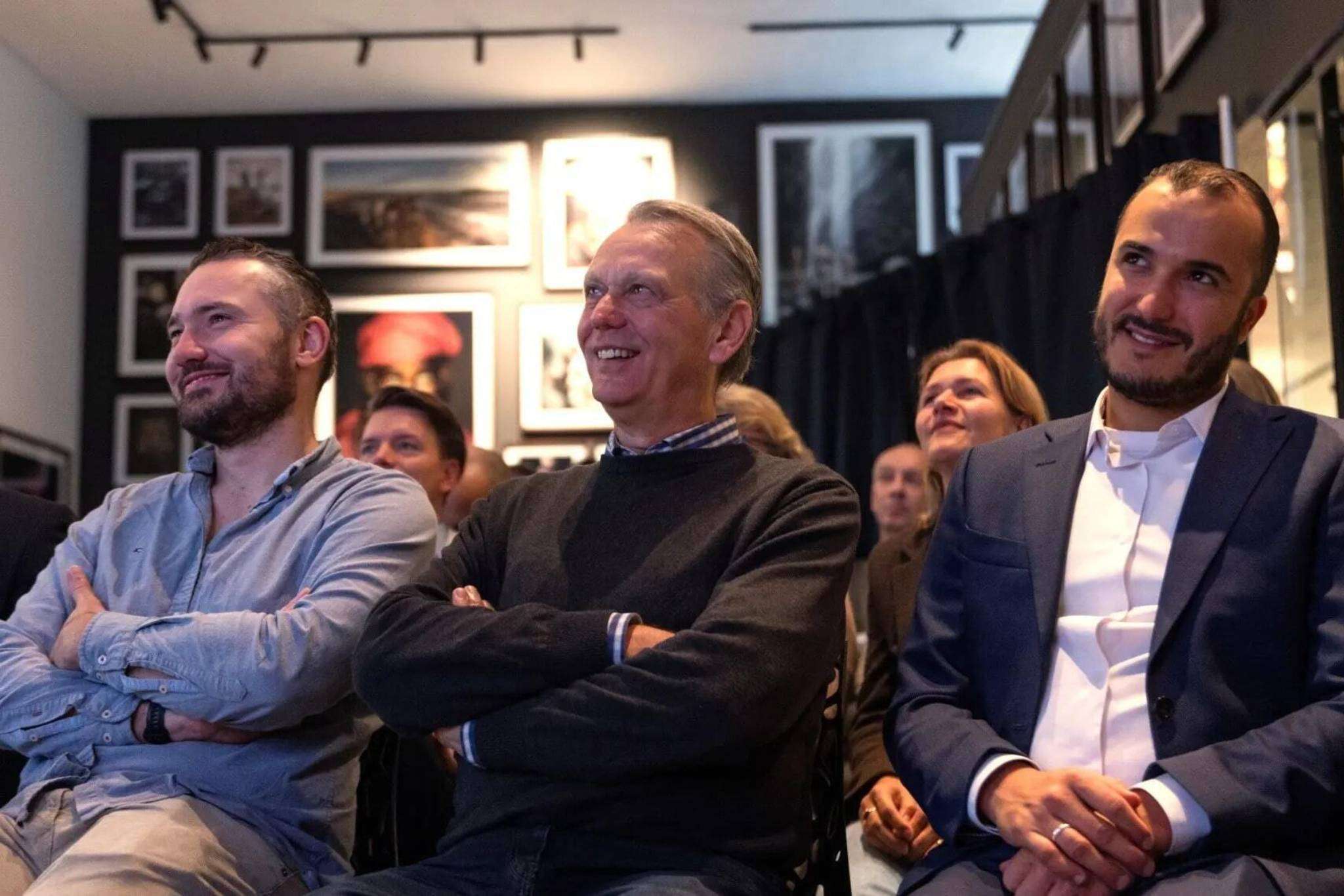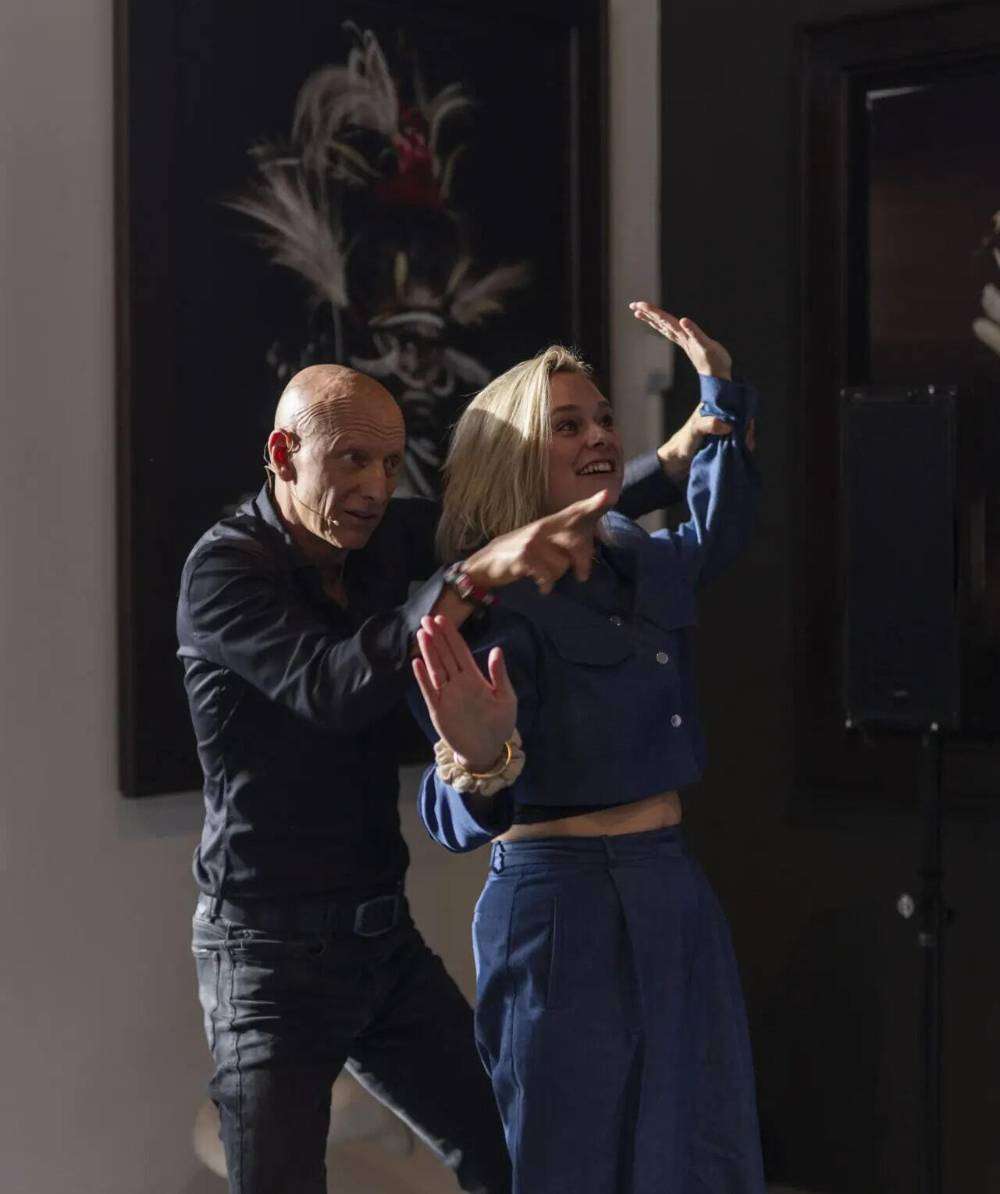Wonder and inspiration with Jimmy Nelson & Jitske Kramer

"After 27 years in finance, it's time for new insights," says Jeroen Groothuis, taking a big bite of yogurt with blueberries from a black stone bowl. "That's why I'm here. If you don't keep learning new things, you slowly die inside."
In the early morning, Jeroen, the director of the Supervisory Office at de Volksbank, has travelled to Amsterdam Zuid on this cloudy November morning to attend our breakfast session. This year, we welcomed two extraordinary speakers: corporate anthropologist Jitske Kramer and photographer Jimmy Nelson. The talks are taking place in Jimmy’s studio, adorned with his powerful photography. There’s plenty to talk about.

Suprising
Just down the road at the coffee bar stands Jeroen's colleague Bart Vrancken, Volksbank Director of Hub Risk and Compliance. "I have no expectations," he proclaims, as around him more and more people trickle into the softly lit room. "Solid Professionals always surprises me with the approach of the speakers. Something you don't think is applicable to your work can then offer reflection anyway." He looks at a photo of four women in Dutch costume on the beach. "And that Jimmy's work is hanging on the wall here in all its glory ... Very nice. It's going to be a very cool session, though." For a moment he falls silent. "Actually, I do have some expectations," he adds. He has to chuckle at this.
Time for the first speaker. The more than eighty guests make their way to the rows of black chairs, looking out at a screen, native masks and once again impressive photography. Some quickly grab a croissant, and the cheerful chatter dies down when our director Kathelijn Loos and head of talent management Lieke Galema take the floor. Kathelijn: "Today we are going to take a different approach. You won't get to see presentations about new laws and regulations, or developments in our industry. Instead, we want to invite you to dare to look at the world and leadership differently and with an open mind. Today we are exploring human wealth in a different way."
Campfire session instead of a bullet point meeting
The most important tip she imparts is to truly listen. “Like at a campfire. That’s when you really listen to what’s being said. Is your meeting a bullet point meeting, where the decision has already been made, and input doesn’t matter? Or can you incorporate elements of a campfire session, where a conversation happens without an immediate judgment about something or someone?” She concludes with, “Safe travels,” and applause erupts.
During the break, over coffee and fresh baklava, conversations continue about Jitske’s presentation. “Inspiring,” says Aimee Pijnacker, who has been in the industry for 23 years. “That’s what it’s about. Showing genuine interest and giving people the freedom to think along.”
Leaving automatic pilot behind
Pim van Koeveringe, working as an independent senior finance professional, is also amazed by Jitske's story. "That comes in, and makes you think. You do so much on autopilot." After a meeting, Jitske says you should call those involved to ask what it does to them, when they have or have not been listened to. "But I don't make those calls very often," Pim admits honestly. "We're more into pushing through. A feet-on-the-table session like that would be quite something."
It's Jimmy's turn, and he begins his story with a half-minute of silence. "Last week I heard my employees whining about the rain. It's just water falling on our heads here. I would like to reflect on the fact that in other places in the world very different things fall from the sky."
Over the next hour, the world-renowned photographer unfolds his story in a disarming, ultra-personal and emotional way. The audience is dead silent and hangs on his every word. No one looks at his phone and many a listener's eyes occasionally well up with tears. Jimmy talks about his abuse as a child, the loss of all his hair due to alopecia and the lockdown mode he shot into. At seventeen he had nothing left to lose and left for Tibet, from which he returned after three years with a regained love for man, the world and himself. But also with four photographs published in Britain's National Geographic.

Connection can happen anywhere
In his passionate and somewhat eccentric way, he recounts his journeys, during which he established unique connections with the most diverse cultures in the world’s most remote places. By being vulnerable and genuine, he shows that in his quest for love, he is here for everyone, to see them. He doesn’t pose a threat, doesn’t pretend to be someone else; he’s here to see us and share his love. Jimmy’s enthusiasm for his fellow human beings is infectious, and he occasionally pulls people from the audience to pose, demonstrating how he spends weeks capturing the perfect photo.
The British photographer concludes with a montage of portraits, rapidly flashing on the screen. It reads, ‘We are all one.’ There’s a moment of silence, and then enthusiastic applause fills the room. As the audience continues to be amazed by the keynote, Jimmy brings a ladder forward to take a photo of us.

Really listening
“Beautiful,” says Anne Friedrich, head of the centre of expertise at Rabobank. “It’s about seeing more than just the surface. And that aligns perfectly with Jitske’s story.” Klaartje van Gasteren from our partner organisation, De School voor Transitie, is deeply impressed too. “There’s so much more that connects us than drives us apart. And it starts with building relationships.” Jeroen Groothuis was amazed by the attention everyone gave to the stories. “No one was distracted by their own trivial matters. People were truly listening.”
Our director Sabine ten Brinke confesses that she, too, was deeply moved by Jimmy. “He shows how beautiful it is when you set aside stereotypes. And I want to apply Jitske’s campfire sessions. To truly hear what someone has to say, beyond the established bullet points.”
It’s noon, and the breakfast session comes to an end. One by one, the guests depart, returning to the world of banks, offices, and desks. But the words and images of Jitske and Jimmy continue to resonate for a while.